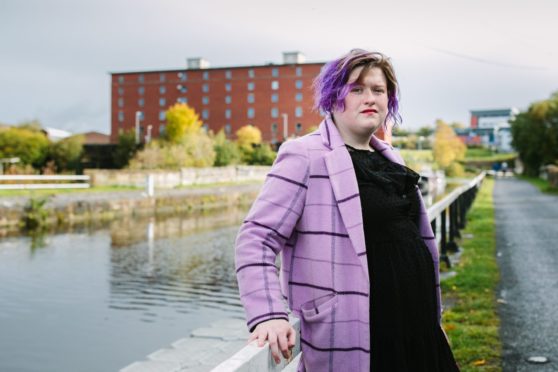
Charlie MacKenzie did not think she would survive her teens. In her darkest hours, she did not want to.
The student and charity volunteer from Glasgow recounts her four-year struggle to secure mental health support. She fears for other young people struggling without help during the pandemic.
She told The Sunday Post: “I have struggled for about as long as I can remember. I was diagnosed as being on the autism spectrum when I was eight years old and have had lifelong struggles with social anxiety. I started to self-harm aged 11 and, in 2010, I was in my first year of high school when I started having suicidal thoughts and first attempted to take my life.
“My mum first sought help from our GP when I was 13 but my GP brushed off my behaviour and self-harming as “teenage hormones”, attention seeking and refused to refer me to CAMHS.
“Later that year, I had a referral to CAMHS after I had an anxiety attack in class but it was refused. That made me feel as though I wasn’t worthy of help.
“When I was finally accepted to CAMHS, my experience was mixed. I often felt that the severity of my issues wasn’t always fully appreciated, and when they were taken seriously, I could tell there were very limited resources available.
“I was seen once a month by a psychiatrist from 2014 until 2016. I repeatedly asked if I could have psychological therapy, as medication alone wasn’t helping. I was always told no, often because there were none available.
“I realised the only way I would get help was if things really escalated because no one was listening. My self-harm got more severe and my suicide attempts got more serious. My lowest point was when I was 17. I was in and out of hospital and had accepted that I would die before my 18th birthday. I lost all hope that I would get better and couldn’t see a future for myself.
“Things changed when I started working with a psychologist six months before my discharge in January 2017. It made a big difference but I often wonder how different my life would be if I got the right help at the right time.
“Last year, I had a very good adult psychiatrist, and I’ve managed to access long-term evidence-based psychotherapy. I’m still a long way away from “recovered” but I don’t self-harm anymore, and it’s been almost two years since my last suicide attempt.
“I’m very worried for young people who are waiting for support. I remember the weight of dealing with my mental health alone, without support from CAMHS, was crushing. And that was without the added impact of a pandemic and the stress and uncertainty that it brings.
“I don’t think the service is meeting the needs of the majority of people that use it. That’s down to the limitations put in place by decades of cuts to the service, not the people working in the service, who are trying to do what is best for children and young people in increasingly difficult circumstances.
“I would like the government to follow through on their promise to appropriately fund mental health services, and to see young people’s mental health especially as a priority and ensure that CAMHS actually gets that money.
“The pandemic is happening at a key developmental stage for many young people, meaning the impacts will be felt for many years.”
Samaritans can be contacted via their helpline 116 123 or by email jo@samaritans.org

Enjoy the convenience of having The Sunday Post delivered as a digital ePaper straight to your smartphone, tablet or computer.
Subscribe for only £5.49 a month and enjoy all the benefits of the printed paper as a digital replica.
Subscribe